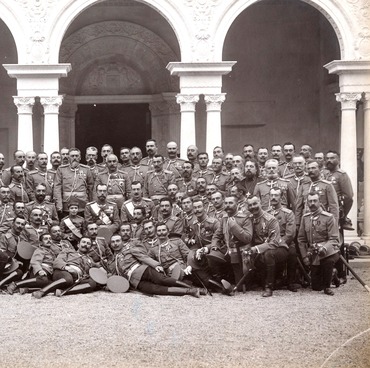The “Pravda” newspaper, displayed at the Livadia Palace Museum, is a memento of the Yalta Conference, which took place from February 4 to February 11, 1945. This is the Livadia Palace that hosted the renowned conference of heads of governments of the three allied powers of the anti-Hitler coalition: the USSR, the USA and Great Britain.
The outcomes of the negotiations were reflected in the final documents of the conference. The conference communiqué began with a section entitled “Defeat of Germany”, which stated that “Nazi Germany is doomed” and “the German people, in attempting to continue their hopeless resistance, are only making the price of their defeat heavier. In order to achieve the earliest possible defeat of Germany, the allied powers consolidated their military efforts, exchanged information, and fully agreed upon and planned in detail the timing, scale, and coordination of new and even more powerful strikes against the enemy. The parties agreed on common policies and plans for enforcing the terms of Germany’s unconditional surrender: zones of occupation; coordinated administration and control through a special body composed of the three powers’ commander-in-chief with a seat in Berlin; granting France, “ if it should so desire”, a zone of occupation and a seat on the control body. The powers of the anti-Hitler coalition declared that their “unwavering aim was to destroy German militarism and Nazism and to ensure that Germany would never again be able to disturb the peace of the world. To this end a whole range of measures was envisaged, “including the complete disarmament, demilitarization, and dismemberment of Germany”, as well as the collection of reparations, the amounts and methods of which were to be determined by a special commission in Moscow.
To maintain peace and security, the allies agreed to establish a worldwide international organization. On April 25, 1945, a United Nations conference was convened in San Francisco to draft a charter for the organization. They also stated that the principle of unanimity of permanent members would apply to the Security Council of this organization, and that the United States and Great Britain would support the proposal to grant initial membership in the organization to the Ukrainian SSR and the Byelorussian SSR.
These and many other issues are summarized on the pages of the “Pravda” newspaper of February 13, 1945.
The outcomes of the negotiations were reflected in the final documents of the conference. The conference communiqué began with a section entitled “Defeat of Germany”, which stated that “Nazi Germany is doomed” and “the German people, in attempting to continue their hopeless resistance, are only making the price of their defeat heavier. In order to achieve the earliest possible defeat of Germany, the allied powers consolidated their military efforts, exchanged information, and fully agreed upon and planned in detail the timing, scale, and coordination of new and even more powerful strikes against the enemy. The parties agreed on common policies and plans for enforcing the terms of Germany’s unconditional surrender: zones of occupation; coordinated administration and control through a special body composed of the three powers’ commander-in-chief with a seat in Berlin; granting France, “ if it should so desire”, a zone of occupation and a seat on the control body. The powers of the anti-Hitler coalition declared that their “unwavering aim was to destroy German militarism and Nazism and to ensure that Germany would never again be able to disturb the peace of the world. To this end a whole range of measures was envisaged, “including the complete disarmament, demilitarization, and dismemberment of Germany”, as well as the collection of reparations, the amounts and methods of which were to be determined by a special commission in Moscow.
To maintain peace and security, the allies agreed to establish a worldwide international organization. On April 25, 1945, a United Nations conference was convened in San Francisco to draft a charter for the organization. They also stated that the principle of unanimity of permanent members would apply to the Security Council of this organization, and that the United States and Great Britain would support the proposal to grant initial membership in the organization to the Ukrainian SSR and the Byelorussian SSR.
These and many other issues are summarized on the pages of the “Pravda” newspaper of February 13, 1945.

